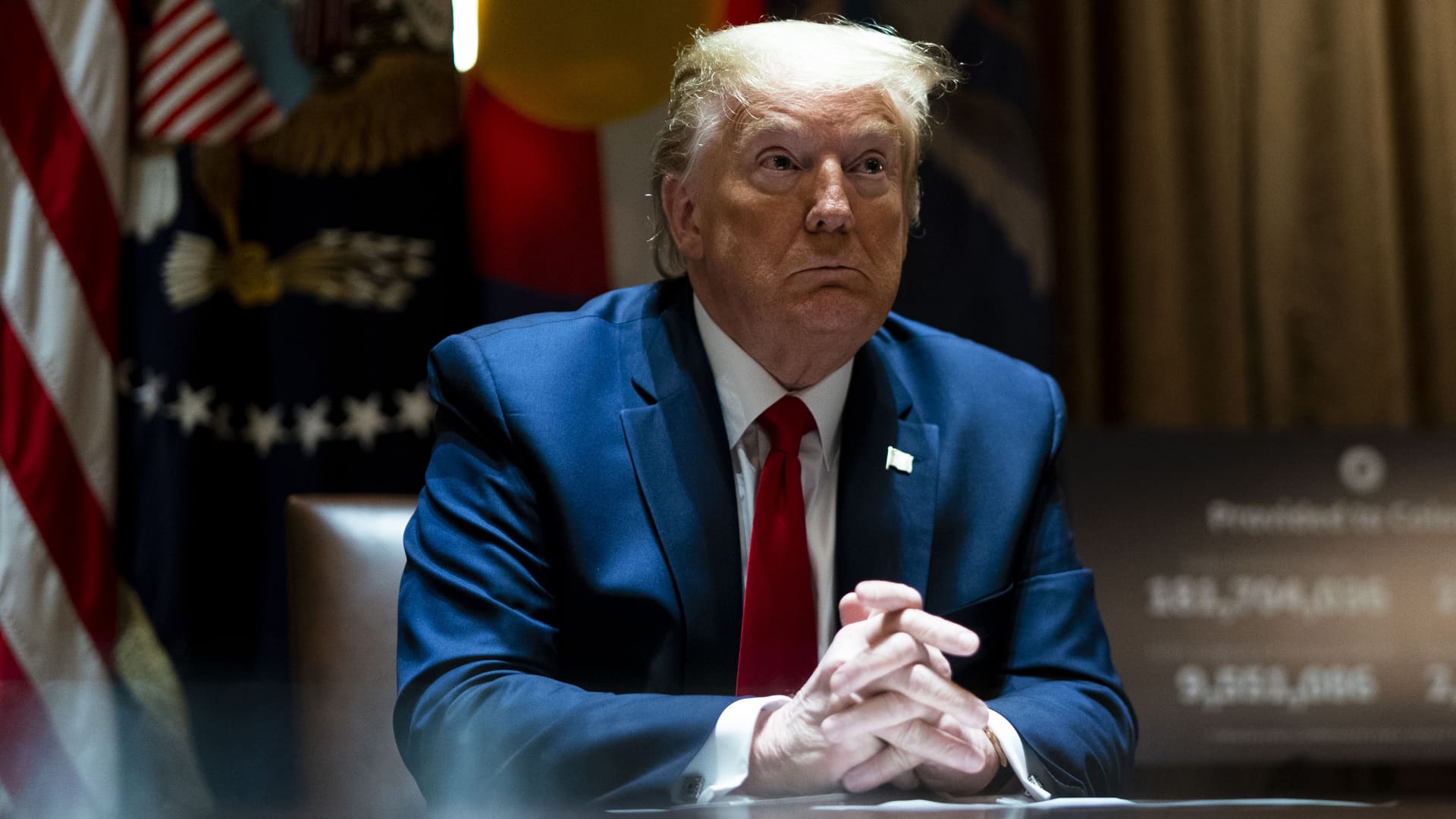U.S. President Donald Trump looks on he as meets with Colorado Governor Jared Polis and North Dakota Governor Doug Burgum in the Cabinet Room of the White House on May 13, 2020 in Washington, DC.
Doug Mills-Pool | Getty Images
The Supreme Court is set Thursday morning to hear oral arguments on an effort by former President Donald Trump to reverse a ruling by Colorado’s top court barring him from that state’s 2024 Republican presidential primary ballot.
The arguments, which are expected to last several hours, come as Trump has a commanding lead in the national GOP primary race, with a long-shot bid from former South Carolina Gov. Nikki Haley appearing to be the only potential stumbling block to him securing the party’s nomination this summer.
The Colorado Supreme Court in December ruled that Trump is disqualified from holding the office of president because he “engaged in insurrection” by inciting the 2021 Capitol riot as part of his effort to reverse his loss to President Joe Biden in the 2020 election.
That bombshell 4-3 ruling was based on Section 3 of the 14th Amendment to the U.S. Constitution, which states “no person” can serve as an officer of the United States who, having previously taken an oath of federal office, “engaged in insurrection or rebellion” against the U.S.
Six Republican and unaffiliated voters in Colorado had filed the lawsuit that led to the state Supreme Court ruling.
Trump’s lawyers in a brief filed with the U.S. Supreme Court last month argued that the Colorado court decision was “based on a dubious interpretation” of Section 3, while noting that similar efforts to bar Trump from presidential ballots are underway in more than 30 states.
The U.S. Supreme Court “should put a swift and decisive end to these ballot-disqualification efforts, which threaten to disenfranchise tens of millions of Americans and which promise to unleash chaos and bedlam if other state courts and state officials follow Colorado’s lead and exclude the likely Republican presidential nominee from their ballots,” Trump’s lawyers wrote.
Those lawyers said Trump “is not even subject” to Section 3 because a president is “not an ‘officer of the United States’ under the Constitution.”
The attorneys also argue that even if Trump were subject to the provision, he did not engage in any conduct that qualifies as an insurrection.
Sean Grimsley, one of the lawyers representing the plaintiffs in the case that led to Trump’s disqualification, during a call with reporters Wednesday said that Trump’s claim that he was not an officer of the United States as president has become his lead argument in the case.
Grimsley predicted that claim will be closely scrutinized by the Supreme Court justices during oral arguments.
“I think the justices will be very interested in that question, if only because President or former President Trump has made that the lead argument in this case,” Grimsley said.
He and another lawyer for the plaintiffs dismissed that argument.
They said it was obvious that a president is an officer of the United States and that it requires “linguistic acrobatics” to argue otherwise.
Mario Nicolais, one of the plaintiffs’ lawyers, acknowledged that to win the case the attorneys on his side “have to win every argument” they are making to disqualify Trump.
“We think we will,” Nicolais said.
“We think we win so many of those arguments on multiple different levels, and that’s why we feel very strongly that we will win this case,” he said.
The plaintiffs’ key arguments are that Trump engaged in insurrection against the Constitution, and Section 3 applies to insurrectionist presidents, that state courts can adjudicate Section 3 under state ballot access laws, and that states can exclude presidential candidates from ballots if they are deemed constitutionally ineligible.
The plaintiffs also argue that Congress does not have to first deem a candidate ineligible under Section 3.
“Donald Trump is disqualified today,” Nicolais said. “He was disqualified on Jan. 6, 2021, when he engaged in that, he disqualified himself under our Constitution.”
Three of the nine Supreme Court justices who will hear his appeal Thursday were appointed by Trump — Neil Gorsuch, Brett Kavanaugh and Amy Coney Barrett. Three other justices who were appointed by Republican presidents with Trump’s appointees comprise a conservative supermajority on the Supreme Court.
Despite that bloc, Trump has failed to get the Supreme Court to take his side in a number of past cases, including in his efforts to challenge the voting processes and results during the 2020 presidential election.
Don’t miss these stories from CNBC PRO:

